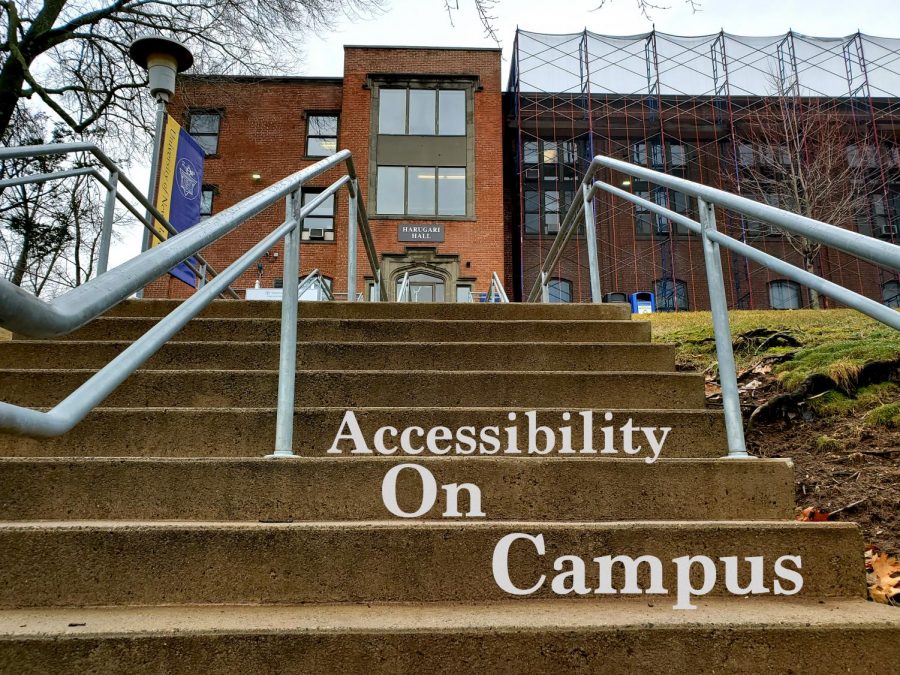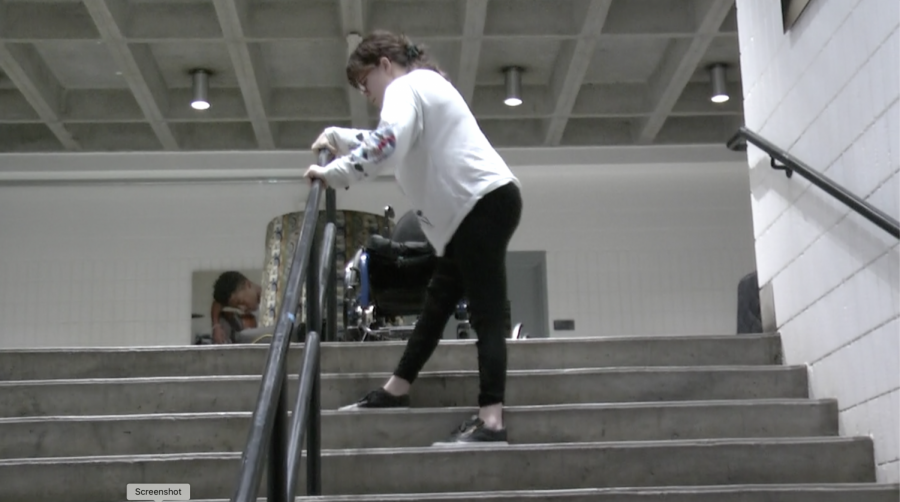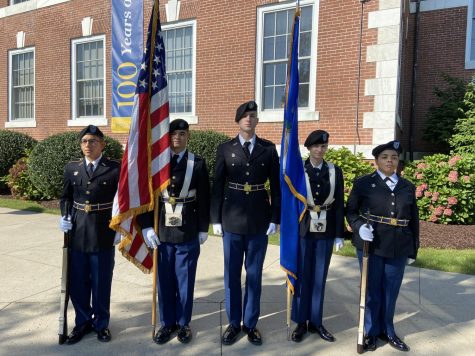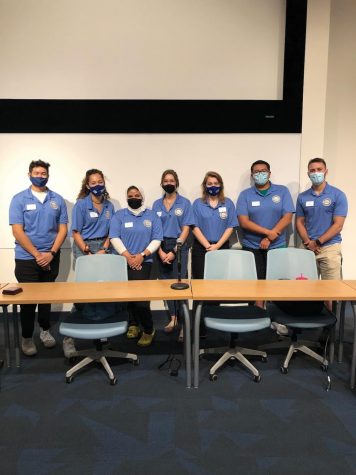Student with Wheelchair Speaks Out About Campus Inaccessibility and Safety Issues
“I couldn’t even get in the door, so how am I supposed to find my school spirit?” said Maria (Ria) Maisonet.
Ria Maisonet, freshman communication and music and sound recording double major, has been battling the university to improve campus safety and accessibility.
Maisonet has a neuromuscular disease called Charcot-Marie-Tooth type 1E, which affects muscle and nervous system function. Maisonet needs a Drive royale 4 to navigate campus.
For classroom and living accommodations, Maisonet works with the campus Accessibility Resource Center (ARC). Maisonet has a room on the second floor in Bergami Hall, with an attached bathroom that is wheelchair accessible. ARC has also helped Maisonet obtain accommodation letters for classes.
However, Maisonet said the campus experience has been a struggle.
In the event of a fire, for Maisonet to exit her second-floor room via wheelchair would have been difficult, if not impossible. Linda Copney-Okeke, director of ARC, told Maisonet to call 911 in the case of an emergency, but Maisonet’s mother said she did not feel that this was a safe solution.
Maisonet’s mother, Jessica Purcell said, “I had reached out stating that I didn’t feel it appropriate Maria continually dial 911 because most of these instances could be a planned drill or an accident and not necessary for 911 to be dialed. I found it difficult to believe that there was no plan placed with a school in particular that has a fire program.”
Rebecca Johnson, dean of students, declined an on-camera interview, but said in an email: “The University Fire Marshall is available to speak with students regarding individually tailored evacuation instructions.”
When Johnson put Maisonet in contact with Chris Reed, the university fire marshall, Maisonet and Purcell said they learned that Reed should have been informed of Maisonet’s disability, for the school’s database that lists students with disabilities and their dorms. However, Reed said he was unaware of Maisonet’s condition until he spoke with the student.
Copney-Okeke said in Maisonet’s grievance which Purcell and Maisonet shared with the Charger Bulletin: “I was contacted to provide a list of students who I was aware might need assistance in the case of emergency. I have not been contacted prior to this for a list and can only assume that Residential Life has been providing any information needed to the Fire Marshall given that they are aware of a student’s request for modified housing related to a disability.”
“I had one [classroom] where they told me it was appropriate for me to sit in a staircase during class without a desk,” said Maisonet. “My response was, ‘Well, why am I paying all this money to not have a desk in a room?’”
Maisonet encountered a similar situation in a physics lab this semester before the campus closed. It took three weeks to get a desk low enough for Maisonet to complete lab work, she said.
Maisonet said Harugari Hall, Charger Plaza, Echlin Hall, Bucknall Theatre, North Campus, Dunham Hall, Bixler Hall, Gerber Hall, and Winchester Hall are inaccessible in her wheelchair.
Copney-Okeke declined an on-camera interview with the Charger Bulletin about accessibility issues on campus, and as of press time, had not responded to emailed questions.
“The University has engaged in a continuous program of remediation, with a goal of eventually bringing all of its buildings into full compliance with the ADA… The University’s older buildings (e.g. Maxcy, Echlin, Bethel, South Campus, Harugari) were constructed prior to the existence of the ADA’s accessibility requirements. These buildings are currently identified for future, major renovations,” said Johnson in her email response.
Until renovations are made, some buildings and classrooms remain inaccessible, and that includes some classes necessary for Maisonet’s degree.
For example, Studio C in Dodd’s Hall is at the bottom of a flight of stairs with no wheelchair access. The room is used for several classes that are required for all music majors.
“My friends didn’t want me to miss out so I went down the stairs and they carried my chair up and down,” said Maisonet.
Chad Celini, a freshman majoring in forensic science and Maisonet’s friend, said, “It’s been so difficult to get the university to see how much of an issue it was” for his friend.
Maisonet said the ARC also failed to act on other safety concerns, including navigating the campus during inclement weather. Maisonet was originally told to carry an umbrella.
And then there were the shuttles.
“I learned that there were shuttles and I asked about that and they said they don’t have them,” said Maisonet. Friends often helped Maisonet get around campus because they said they were concerned about Maisonet’s safety.
Celini said that he once had to “push [Maisonet] all the way to Bergami from Bartels” when Maisonet’s wheelchair broke down in the rain.
Purcell said, “ARC is supposed to be a department put in place to help her be able to access this school the same as everyone else, yet somehow has made her feel like a complainer, a burden, and not heard.”
Before committing to the university, “we were assured that everything was accessible and if it wasn’t, it would quickly be fixed,” said Maisonet.
Maisonet says if she had been aware of the accessibility issues on campus, “I wouldn’t have come here no matter how good the program was.”
Maisonet said she considered “dropping out because I felt like college wasn’t a place for people with physical limitations and that was the message I was getting from campus.”
“I hated this school,” said Maisonet. “I felt like an outcast, I felt like an inconvenience, and definitely not like a Charger.”
After a semester of arguing for proper accommodations, Maisonet and Purcell filed a grievance for violation of the ADA. By law, the ADA says that students with disabilities should have the same access to school as all students and receive accommodations to do so. A grievance allows a student to open a university investigation about a “complaint alleging any policy, procedure, or practice,” according to the student handbook.
Frederic Baker, senior associate dean of students, investigated Maisonet’s claims against the ARC and Johnson, but according to school protocol, as accessibility coordinator, “Dean Johnson has the ultimate authority,” said Baker.
However, Baker investigates claims and makes findings and recommendations to Johnson. Failing that, “there is a way to contact the state of Connecticut to resolve a higher level grievance if they are not satisfied with the campus’s ultimate findings,” he said.
The grievance — which Maisonet and Purcell provided to the Charger Bulletin — offers Purcell’s written statements about why she believed Johnson and Copney-Okeke were not taking the proper steps to help Maisonet. Johnson, Copney-Okeke, and Baker offered a response to each statement. In the end, Baker made four recommendations as to how Johnson and the ARC would improve the disability issues on campus.
The final recommendation, made by Baker in the grievance, says that the ARC will inspect each class before the term starts to make sure that they are accessible and that if Maisonet wants to join any student club, Maisonet should contact that club to discuss accessibility.
The recommendation about fire safety says there should be “A review of the communication protocols between the Accessibility Resource Center, Office of Residential Life, and the University Fire Marshal for students with documented physical disabilities that impact fire safety protocols.”
Maisonet feels the school did not take steps toward improving the accessibility and safety plan for students with disabilities, but Maisonet isn’t done fighting.
For students with disabilities who consider attending the University of New Haven, Maisonet said, from experience, “You’re going to have to fight to prove every day that you belong here and you deserve to be here.”
“Remember you have a voice.”
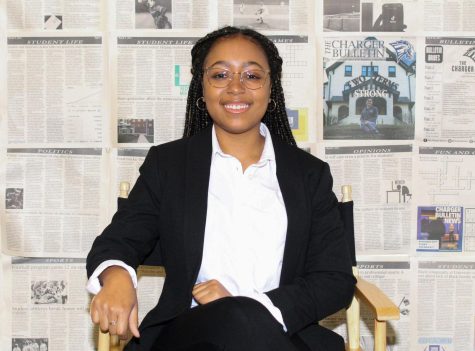
Jada Clarke is a senior communication major with a concentration in TV/video production and a minor in business management. Throughout her college career,...
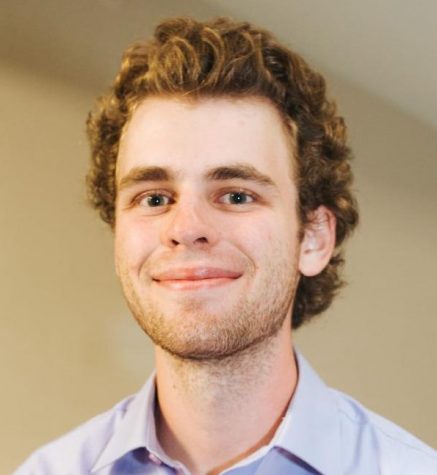
Seth Harrington is a communications major with concentrations in film production and TV/Video production. He has been a part of the Charger Bulletin's...



